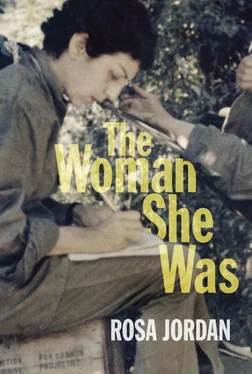“So what did you buy?” Celia teased. “Crotchless panties or a nippleless bra?”
Franci stood hands on hips, half indignant, half laughing. “I wish you could have seen her, Celia. Twitching her little behind and batting her eyes.” Franci twitched and batted her own in a parody of a sexy come-on and mimicked her mother-in-law. “‘Les hommes, they find such things très alluring, n’est-ce pas?’”
Franci flopped back in her chair and began smearing butter on her bread. “I felt like telling her, ‘Maman, this girl goes to bed in her very own silky black ass, and your son has never failed to find that alluring.’”
Celia, doubled over in laughter at Franci’s demonstration and commentary, finally was able to gasp, “Oh Franci! I am sorry. I know this is not funny for you.”
“Well, actually it is. Afterwards. It’s just that any joke you have to put up with over and over gets old. And annoying.’”
“What is the baby issue?” Celia asked.
Franci looked at her in surprise, almost hurt. “Why, you know I can’t—”
“Oh of course! I meant—” Celia interrupted quickly. “Well, having a baby is not the only way to get one. So I just wondered…” Celia let her voice trail off, suddenly aware of how tactless it was to ask such a question when Franci was already feeling raw. “I’m sorry.”
“No, that’s okay. You’re right, there are other issues, and they’re no secret. Not between Philip and me anyway.” Franci gazed out the window to where children could be heard, but not seen, playing in the street. “He was ready for kids ten years ago, or even five years ago. But now, well, he’s older than me, you know. He’s almost forty-five. He thinks he’s too old to cope with an infant.”
“Oh.” Celia regretted having asked. Philip and Franci were her ideal couple. She did not want to know that they had something so serious dividing them.
“That’s his reason,” Franci went on. “But I have my reasons too.”
Celia looked up in surprise. “Your reason for what?”
“For not wanting kids.” At Celia’s questioning look, she stabbed the butter knife toward the garage apartment and backyard cottage. “Them. They’d criticize everything I did. It would be bad enough for me. But for the child, can you imagine? They’d be on that baby like vultures on roadkill. Then there would be the religious wars, with each of them determined to induct it into her particular religion, holy water, chicken blood, who knows what?”
Morosely, Franci munched her buttered bread. “Philip and I went into this mother arrangement with our eyes open. We knew they’d be taking more and more of our time as they got older. Having them nearby we could see them often, but in shorter segments, and not have to waste all that time running back and forth.”
“And you thought they would be company for each other.”
“Yes, and it worked out just the way we hoped. Also, Philip and I figured out in advance what they were likely to do that could divide us, and came up with strategies to defend ourselves. But you can’t teach an infant or toddler to defend itself against manipulative love. Not to mention competitive love, which theirs surely would be.”
Franci began clearing the table. “The only way would be if I quit my job and stayed home to protect the poor kid.” She stopped, dishes in hand, dark eyes wide with unshed tears. “The honest truth is, much as I want a child, I don’t want one enough to give up my career.”
Celia carried their glasses to the sink and put her arms around Franci. “Have I told you lately what a wise, intelligent, thoughtful woman you are?”
“Well, not lately ,” Franci conceded. “But compliments sound more sincere when you space them out. Now tell me, did you get a hot shower at El Saltón last night?”
“Well, no. The water was not hot, and it was not El Saltón. As soon as I get myself in and out of one here, I’ll tell you where I went. But you take yours first. I’ll do the dishes.”
“No!” Franci blocked the sink with her body. “I already took a shower. This afternoon, after I finished ‘alluring’ Philip.” She gave Celia a push. “Go! I wash two bowls, two spoons, and two glasses while you wash one you. Then we’ll meet in my bedroom for a pyjama party, and you will tell me all about what you’ve been up to for the past thirty hours.”
Standing in the shower, Celia again argued with herself over whether to tell Franci about the hallucinations. It would have been hard enough before. Now she could not imagine trying to explain it, even to her best friend—or maybe especially to her best friend. Franci would want to link the Camandancia episode to Celia’s mother and urge her to examine that relationship. It might look relevant but Celia was certain it was not. That was the trouble with using your best friend as a shrink, she thought with a wry smile. Not only does she know you too well; you know her too well and know in advance exactly what she’d say.
So no, she would not go there. Not on this trip anyway. Franci’s domestic problems had completely extracted her from her own hallucinatory world and its spillover into real life. She would think of something personal to tell Franci; after all, that was a cardinal rule of female friendship: confidences must be repaid with confidences. But it would not be about Celia Sánchez and Fidel Castro, much less about Celia Cantú and a bearded stranger named Miguel Ortega Ramos.
CELIA found Franci sitting up against the headboard of her king-sized bed. “Very alluring,” she purred, batting her eyes at Franci’s oversized white T-shirt decorated with nautical signal flags.
“You bet.” Franci grinned, passing Celia a pillow. “Anytime I get, um, you know, I just signal the Navy.”
Celia climbed onto the bed next to Franci and adjusted the pillow. Countless hours of their adolescence and college years had been spent like this, backs against the headboard of one or the other’s bed, Celia’s sun-browned legs stretched out alongside Franci’s longer, darker ones, sharing secrets and using each other as sounding board and morale booster. They still got together two or three times a year, but hardly ever one on one anymore.
“What a treat!” Celia murmured. Even though she had more to conceal from Franci now than before, she felt less tense.
“So where did you spend the night?” Franci asked.
“In Santo Domingo. This morning I hiked up to La Comandancia de La Plata.”
“You’re kidding! You drove all that way? What on earth for? Wasn’t it raining? It poured here.”
Celia ignored the question about the rain. Rain, at least that rain, felt too intimate to discuss. Instead she said, “I intended to go to El Saltón, but it felt good to be driving so I kept going. Around Bayamo I started thinking about Joaquín, which started me thinking about my father. And thinking about him started me thinking about my mother.”
“And that took you to La Comandancia?” Franci surmised.
“I guess. I knew she was recruited by Celia Sánchez; they talked about it that one time my mother took me to visit her. And Mamá was proud of the fact that she got her medic training from Che. But since she spent most of the war under Raúl’s command in the Oriente, and that was where she met my father, their war stories were all about what happened there. Especially the casualties they suffered in the bombing raids. Veterans were forever telling Carolina and me how our mother’s nursing saved their life.”
Celia scratched a mosquito bite on her ankle. “Those old duffs could get so angry, just recounting how Batista’s bombers were allowed to run raids from the US base in Guantánamo.” Celia paused and glanced at Franci. “You know what I mean? They were the wounded, yet it was the politics of the situation they relived. Only Mamá talked about the human tragedies.”
Читать дальше












